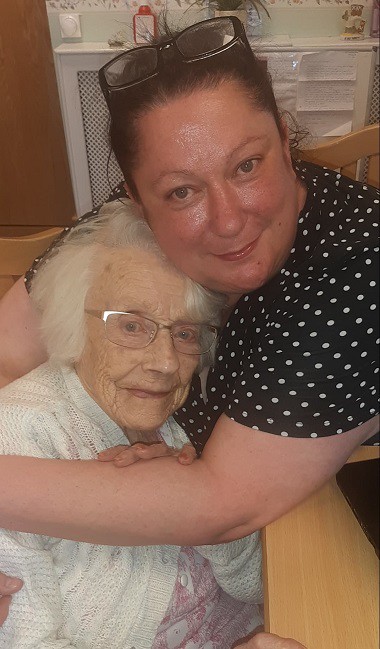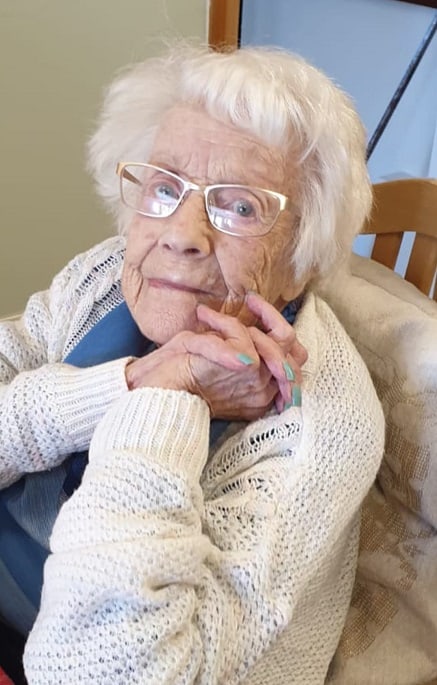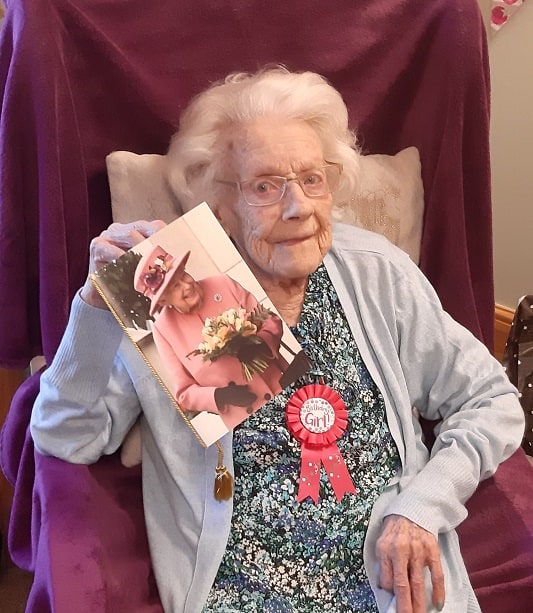
A card from the Queen and a visit from the Salvation Army will mark the 100th birthday of Ramsgate resident Irene Gowers.
Irene has been part of the Newlyn Residential Home family since 2019 after moving from Sheerness.
She was born on June 22, 1920, in Sittingbourne.
Newlyn manager Toni Selfridge chatted to Irene (both pictured below) about her life.

She said: “She remembers going to Salvation Army Sunday school as a child and she used to visit her grandma in London. Irene remembers having a ride on a camel and an elephant in London Zoo. She was in the Girl Guides as a child.
“During the war Irene made Jettison tanks in the paper mill. She also remembers fondly being a cleaner at The Mission Room school in Sittingbourne. She had one sister, Ivy.
“Irene was married twice. In her first marriage she had her son Trevor. Then when she was married the second time she took on her new husband’s children, Roger and Susan. She said she never thought of them as anything but her own. She didn’t drink but remembers when her dad had an allotment they used to make rhubarb wine. Irene had a sip and it made her squiffy!

“Irene says she doesn’t know the secret of reaching 100 but she thinks it’s because she is lucky and has lots of people around her that love her.
“She is proud to have stood next to the Queen once and says Her Majesty isn’t much taller than her. She also met (comic actor) Richard Hearne – Mr Pastry!
“Irene is a wonderful kind lady.”

In the year Irene was born (1920)
George V was on the throne
David Lloyd George was the coalition Prime Minister
Prince Albert (later George VI), having become Duke of York earlier in the year, meets Elizabeth Bowes-Lyon, who will become his wife in 1923 (and later Queen Elizabeth The Queen Mother).
January–November – experimental radio broadcasts including speech and music are made from a studio at the Marconi Company factory in Chelmsford, Essex
11 February – the Council of the League of Nations meets for the first time in London.
23 February – War Secretary Winston Churchill announces that conscripts will be replaced by a volunteer army of 220,000 men.
10 March – the Ulster Unionist Council accepts the Government’s plan for a Parliament of Northern Ireland.
17 March – Queen Alexandra unveils a monument to Nurse Edith Cavell in London.
27 March – Troytown wins the Grand National.
20 April–12 September – Great Britain and Ireland compete at the Olympics in Antwerp and win 15 gold, 15 silver and 13 bronze medals.
9 June – King George V opens the Imperial War Museum at The Crystal Palace.
3 July – the Scenic Railway (roller coaster) at Dreamland Margate opens, the first in the U.K.
16 July – World War I is officially declared over with Austria.
23 July – fourteen die and one hundred are injured in fierce rioting in Belfast.
22 September – the Metropolitan Police forms the Flying Squad, following an announcement on 17 February that their horses will be replaced by cars.
7 October – the first one hundred women are admitted to study for full degrees at the University of Oxford.
10 October – it is announced that compulsory hand signals are to be introduced for all drivers.
16 October – miners go on strike.
20 October – suffragette Sylvia Pankhurst is charged with sedition after calling upon workers to loot the London Docks.
8 November – Rupert Bear first appears in a cartoon strip in the Daily Express.
10 November – the body of The Unknown Warrior arrives from France aboard HMS Verdun for burial in Westminster Abbey.
11 November – King George V unveils the Cenotaph; The Unknown Warrior is buried.
21 November – Bloody Sunday: the Irish Republican Army, shoot dead fourteen British undercover agents in Dublin, most in their homes. Later this day in retaliation the Auxiliary Division of the Royal Irish Constabulary open fire on a crowd at a Gaelic Athletic Association Football match, killing thirteen spectators and one player and wounding 60
29 November – rationing imposed during World War I ends when the restriction on availability of sugar is lifted by the government.
23 December – Government of Ireland Act 1920, passed by the Parliament of the United Kingdom, receives Royal Assent providing for the partition of Ireland into Northern Ireland and Southern Ireland with separate parliaments

